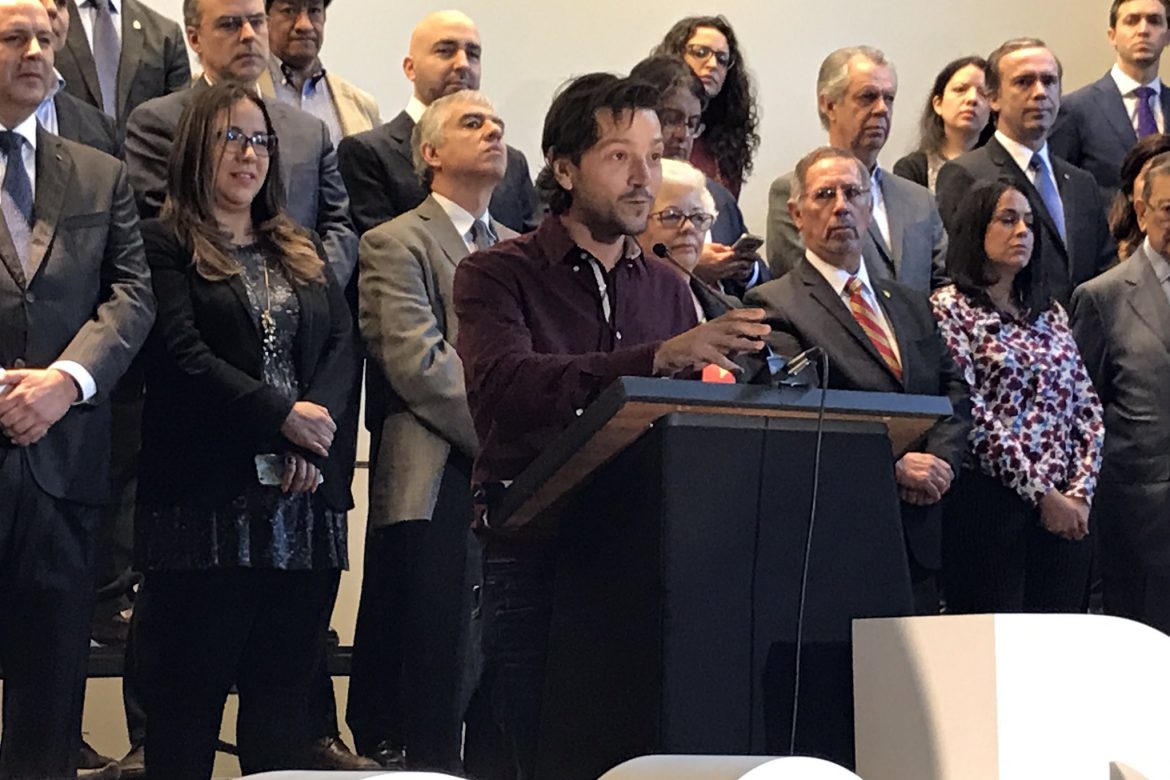This material belongs to: Mexico News Daily.
Mexico’s National Anti-Corruption System (SNA) goes into force tomorrow but a prosecutor to lead it and special corruption-fighting judges have still not been appointed by the Senate, attracting criticism from a new coalition.
A diverse range of organizations, businesspeople, artists and intellectuals have come together to form the collective #VamosPorMás — Let’s Go For More, in English — that will propose a new set of reforms to tackle corruption and impunity and pressure governments at all levels to implement the corruption-fighting strategy.
Well known actor Diego Luna, a spokesperson for the group, added some star power to yesterday’s official launch, declaring, “We’ve reached an unsustainable point” regarding corruption in Mexico.
The group criticized the federal upper house for its “failure, negligence and irresponsibility” for not naming appointments to the key positions and also hit out at state Congresses for failing to create systems at the local level.
María Elena Morera, the president of Causa en Común — one of the organizations that joined the collective — argues that politicians need to be held accountable for their inaction on the issue.
“There must be consequences for these legislators who [have been] irresponsible in the case of the National Anti-Corruption System. But not just for them, we have to pressure local governments because while the SNA is extremely important, where we have more holes are in the local systems.”
The director of the Mexican Institute for Competitiveness (Imco), Juan Pardinas, stated that ideally local anti-corruption systems would already be in full operation for tomorrow’s launch but “unfortunately due to negligence” that will not be the case.
Mexican Employers Federation (Coparmex) president Gustavo de Hoyos added his voice to reiterate that the most urgent outstanding matters for the Senate are the naming of a prosecutor and the ratification of 18 corruption-fighting judges.
President Peña Nieto sent a list of proposed appointees to the Senate almost three months ago but ratification has still not occurred.
However, Eduardo Bohórquez, director of Transparencia Mexicana — an organization dedicated to exposing and eliminating government corruption — said that he was not concerned about the missing judges, arguing that the system could still operate without them.
“There are two ways to tackle this issue, the criminal way and the administrative way. The anti-corruption judges only go the administrative way. The most serious penalty they will impose is a disqualification but we [also] have the criminal way,” he argued.
Luna explained that the collective’s proposal is for a system that is autonomous, independent and effective and one that has democratic checks and balances.
Claudio X. Gonzalez of Mexicanos Contra la Corrupción y la Impunidad (Mexicans Against Corruption and Impunity) backed him up, saying that an effective prosecutor’s office was a priority.
He stressed that #VamosPorMás would do all it could to achieve the legal reforms needed to have the anti-corruption system that Mexico badly needs.
Immunity for public officials, known as the fuero, also needs to be phased out, González stated, to avoid impunity in cases related to officials, legislators and governors.
“Let’s go for more,” Diego Luna urged his fellow Mexicans at the conclusion of his address.
“There are many of us who want to change the country.”


